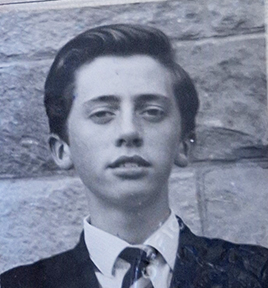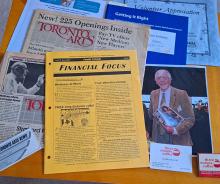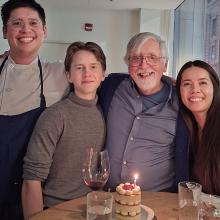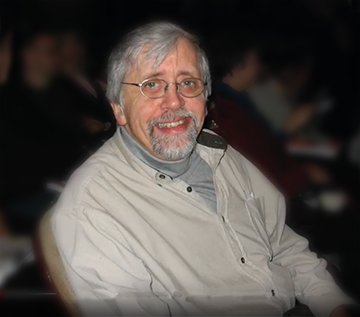I met Peter Holleley fourteen years ago, when running a Toastmasters Group for People who Stutter in Toronto. In his early 60s, he was older than most people attending the group. He liked to talk, as a lot of people who stutter do. We heard about his childhood growing up in Britain, his Ten Month Great Adventure hitchhiking as a young man in North, Central and South America, his business ventures, and his three children. Given his age, I was surprised to find out that two of his children, a son and a daughter, of whom he was a single father, were still in their pre-teen years. His younger son, of whom he shared custody, was just a toddler. Parenthood came later in life for him than it does for most — he first became a father at age 50. One thing Peter does is defy expectations.
Peter was born in 1947 in Birkenhead, England, a seaport that lies on the River Mersey across from Liverpool. The eldest of three children, he was tall, skinny and intensely introverted and shy. Stuttering from a very early age, he had a dreadful time in school, and did not learn to read until age 12. Many years later as an adult, he would be diagnosed with dyslexia. He worked at his father’s business for a few years after dropping out of school, and at age 23 he decided to fulfill a desire to see the world. He left England for New York City in July of 1970, with plans to journey through the Americas and then on to Australia and beyond. A pronounced stutter might deter someone from solo world traveling, but not Peter!

In the years I’ve known Peter, I’ve asked him a few times to write an autobiographical piece for the “Personal Stories” section of the CSA website. However, he does not tend to write or talk about his stuttering. This is unusual as most people who stutter can be quite loquacious about it when asked. In Peter’s case, in order to get the full story, I realized I would have to meet up with him for an interview and write the article myself. So, early this year we met at a study room at the North York Library. It had been a long time since the Toastmasters group, and although we had seen each other at various events over the years, we were not well acquainted anymore. He showed me a photograph of his three children. His two eldest are now young adults, the little boy now a strapping teenager in his senior year of high school. I recorded our conversation on my phone as he began talking about his life.
When Peter left England as a young man back in 1970, his arrival in New York City got off to a bad start. The summer heat and humidity were almost unbearable and his camera was stolen along with some cash almost as soon as he got there. As the Brits do, he kept calm and carried on!
He hitchhiked south to Washington, DC, where he slept in a car on the side of the road. Continuing on down to New Orleans, he stayed in a cheap hotel for three dollars a night, then across to St. Petersburg, Florida, where he took a sailing trip with a widower and his two young children in a 26-foot sailboat. From there, a fellow took him to Miami in a hot Mustang. Hitchhiking onwards, he got picked up by two fellow English lads with a right-hand drive camper that they had shipped over on the Queen Mary! He went North with them to Canada, and then headed off on his own to the West Coast, south to California, Arizona and Mexico and down through Central America to Panama.
It was certainly a more hospitable time for hitchhikers back then. A lot of young people traveled that way in the 1970s. Perhaps it was a less complicated time when trust was more readily extended to strangers. I asked Peter what it was like to travel alone that way with a stutter, having to ask people for rides, getting directions, finding accommodation and places to eat. Did he have any experiences, with regard to the problem stuttering posed, that stood out for him? He thinks a moment.
“I was always so focused just on getting around, getting to where I was going, that no, I didn’t think about it. People were always happy to help me out, helping me get to where I was going. I lived in the moment.”
In any case, Peter’s stuttering did not stand in the way for him, and his adventures and the people he met hitchhiking are a good memory.
One of Peter’s favourite traveling stories is the tale of his adventure getting to South America from Panama. There is no road access, so he managed to hitch a ride with a group of international travelers on a decrepit old inner-harbour barge they had chartered to get to Ecuador.
The unsturdy vessel, a large flat-bottomed rectangular steel box, had been “repaired” by pouring concrete into the hull to seal leaks. It had no radio, no charts or navigation equipment except an aeronautical compass. Burdened with cars and heavy construction materials, it was not comfortable for the passengers, physically or mentally; they worried about its seaworthiness and the navigation abilities of the old and frail captain. This unease turned out to be warranted as one of the engines failed before departure. A passenger who spoke Spanish had to help the crew fix it. Everyone had their fingers crossed, but it did not help. On Christmas Day of 1970 Peter and his fellow shipmates were lost in the Pacific, no land in sight, with limited food supplies. It turned out that the elderly captain couldn’t read the compass, so again a passenger lent a hand to help navigate with a road map. Eventually they found Ecuador’s coastline and followed it south, and on New Year’s Eve they finally got to land. From there Peter traveled on to Peru, Bolivia, Brazil, Uruguay, Argentina and Chile. In Valparaiso, Peter tried to board a cargo freighter en route to Australia, but the captain refused to take him and even had the ship searched before leaving in case he had stowed away.

So, after ten months of traveling, Peter could not afford to proceed to Australia as initially planned. He went back to Canada, where he could legally work as a British citizen, in order to replenish his funds. Bearing North, Peter hitchhiked 5,000 miles in just 10 days.
Once there, he headed for Canada’s commercial centre, Toronto, and got a job selling Collier’s encyclopedias door to door. Encyclopedias were popular then but also expensive — a set cost $400 in 1971 — equal to slightly more than three thousand dollars today. To the astonishment and delight of his crew, he made a cash sale on his first day, and stayed with the job for a time as a trainer and office manager, which proved to be quite successful. Although he stuttered when delivering his sales patter, he made fun of what he was doing with clients and, most of the time, they listened to him.
Peter was successful in other ventures as well, such as the establishment of a new industry in the GTA and Canada – the Office Coffee Service. Working for an American food conglomerate for $20 a day, from May to August 1972 his sales team opened a spectacular 700 new accounts in local businesses! From there he started his own coffee service selling high-end coffee makers to offices, a company called “3 Minute Coffee.” It was much needed in the days before abundant coffee shops or food courts. The business did so well he was able to sell it for a tidy sum years later.
Peter then ventured into publishing. There wasn’t a huge arts and entertainment scene in Toronto then, and no arts media coverage. He launched a free tabloid called “Toronto Arts News,” published 10 times a year. It was the first of its kind in Toronto, but struggled financially, and folded in 1983 when NOW magazine appeared with a million-dollar budget. Peter went on to work in life insurance and finance. When his children came along, they became his passion and focus.

Toronto was not always smooth sailing for Peter. In September 1977, when he was 30, he was attacked one night in a park by five young thugs who brutally kicked him and beat him with a baseball bat. When I ask him about this, Peter explains he has various scars on his body and had his spleen removed due to the injuries. He points to his forehead over his left eye, where the bone around the socket is bumpy. Since the attack, his face is slightly scarred, his eye sockets sunken and his jaw a bit numb and skewed to the right.
I find great pathos at the notion that a man whose life is characterized by a pronounced stutter would be then forced to bear facial disfiguration. He has little to say about it. Some people find it cathartic to elaborate on their personal suffering. Not Peter. Life’s setbacks are simply not a source of rumination for him. Perhaps it is a testament to his strong-willed, introverted-turned-extroverted nature that he is able to face adversity with a stoic “keep calm and carry on” mentality.
I ask Peter about how his stuttering impacted dating and meeting people, and he says that back in his dating days he used ads in the personals section of the newspaper, and they would initially correspond using a post office box. As for running a business, he always had a strong second-in-command who would deal with phone calls, his “Tongue-in-Chief” as he would playfully call them.
Speaking of challenges, Peter describes being a parent as the most rewarding thing in his life, and it has been his focus since becoming a single father and sole parent to his two eldest children. He shares custody of his younger son. His concerns about their education led him to advocate for parents’ and students’ rights to the Toronto District School Board and then the York Region District School Board, and he regularly attends and leads public meetings. Pragmatic, stubborn and confrontational, Peter has never felt hindered when expressing his opinions!

Peter’s stuttering and lack of formal education have not held him back in life. He describes himself as “a BSHK – Bachelor of the School of Hard Knocks.” Today in his elder years his health is declining, and he is embroiled in a legal battle with the Landlord and Tenant Board, and now the Human Rights Tribunal of Ontario, which was covered on the CSA website in an earlier article in April. Yet Peter is grateful for what he has and the opportunities he has enjoyed throughout his life. Today, the company of family and friends are, to him, the most important things!
